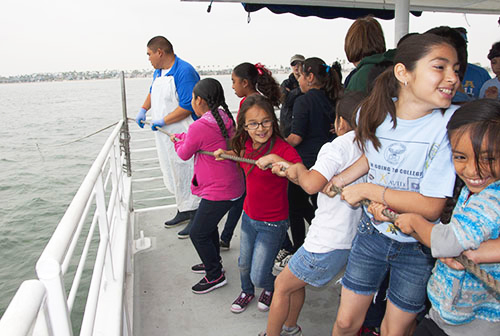The Marine Science Floating Lab (MSFL) is an excellent opportunity for students to explore the amazing biodiversity of what is often a hidden habitat. Watershed and biodiversity are emphasized. Activities include collecting a bottom sediment sample to observe and record invertebrates, an otter trawl net which collects a wide range of fish, mammals, and invertebrates from on and near the bottom, a plankton tow and plankton observation with a microscope, water quality studies, and other activities that may be requested to meet the needs of the specific grade level and curriculum. Students will also observe birds, sea lions, and other marine mammals that may be in the area. While underway to the collection areas, students observe and discuss Los Angeles Harbor, shipping vessels, breakwater function, and a variety of ecosystem and environmental engineering topics.

On a 3-hour cruise through the Long Beach or Los Angeles Harbor, with either a morning or an afternoon departure, students participate in hands-on, marine-science learning activities including:
- a plankton lab
- water visibility testing
- bottom sediment study
- fish morphology
- wildlife observation
Students see first-hand how human behavior affects the quality of water, air, habitat, animal life, plant life, and human life in the marine environment specifically as well as in the students’ communities.










